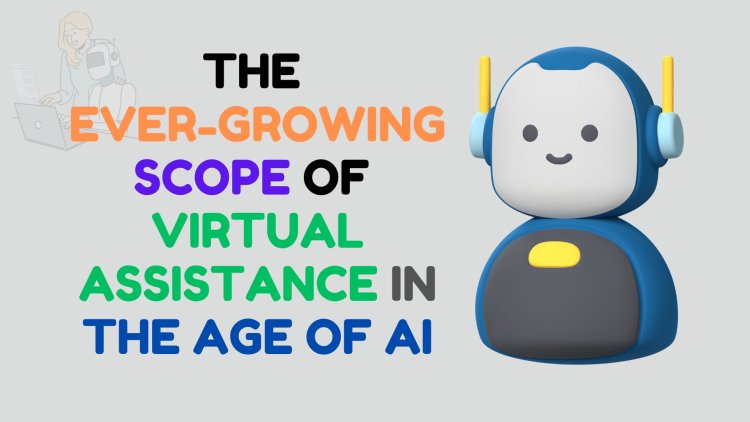The Ever-Growing Scope of Virtual Assistance in the Age of AI
Explore the limitless potential and increasing relevance of virtual assistants in various industries. Learn how AI-driven technologies are shaping the future of virtual assistance, revolutionizing productivity, and streamlining tasks. Stay ahead of the curve and unlock new possibilities with the ever-growing scope of virtual assistance

Introduction:
With the rapid advancement of technology and the rise of AI-powered solutions, some may question the future of virtual assistance in 2023 and beyond. However, the truth is that virtual assistance continues to thrive and evolve alongside emerging technologies. While AI, including chatbots like ChatGPT, has automated certain tasks, virtual assistants still offer unique human skills, expertise, and personalized support. In this article, we will explore the scope of virtual assistance in 2023 and why it remains a valuable resource in various industries.
The Human Touch in Virtual Assistance:
-
Tailored Personalization: One of the key advantages of virtual assistants over AI chatbots is their ability to provide personalized support and adapt to specific client needs. Virtual assistants offer customized solutions, handling tasks that require human judgment, creativity, and critical thinking. They can adapt to individual preferences, understand nuanced instructions, and provide a more personalized experience for clients.
-
Complex Problem Solving: While AI chatbots excel at handling repetitive tasks and providing straightforward information, virtual assistants are better equipped to tackle complex problem-solving scenarios. They can analyze situations, make informed decisions, and apply their expertise to find creative solutions. Virtual assistants are valuable when faced with unique challenges, unexpected circumstances, or non-routine tasks that require human intelligence.
-
Effective Communication and Relationship Building: Building strong relationships with clients is essential in many industries, and virtual assistants excel in fostering effective communication. They possess exceptional interpersonal skills, active listening abilities, and the capacity to understand and empathize with clients. Virtual assistants can provide a human touch, cultivating rapport, trust, and long-term partnerships, which are crucial for client satisfaction and business success.
Expanding Opportunities in 2023 and Beyond:
-
Niche Specialization: Virtual assistants can carve out a niche by specializing in specific industries or offering specialized skills. By focusing on a particular domain, such as healthcare, finance, marketing, or executive assistance, virtual assistants can position themselves as experts in their field and cater to the unique needs of clients within that industry.
-
Multilingual Support: In today's globalized world, businesses often require support in multiple languages. Virtual assistants with language proficiency can bridge communication gaps, facilitate international collaborations, and provide invaluable assistance to clients operating in diverse markets. Being fluent in multiple languages gives virtual assistants a competitive edge and opens doors to a broader client base.
-
Business Process Outsourcing: As businesses continue to seek cost-effective solutions, outsourcing non-core tasks to virtual assistants remains an attractive option. Companies can delegate administrative, customer support, content creation, or social media management tasks to virtual assistants, allowing them to focus on core business operations and strategic initiatives. This trend is expected to grow, creating more opportunities for virtual assistants in various industries.
-
Entrepreneurial Support: With the rise of startups and solopreneurs, virtual assistance becomes crucial for managing the demands of running a business. Virtual assistants can support entrepreneurs in areas such as email management, scheduling, research, marketing, and administrative tasks. As the entrepreneurial landscape continues to flourish, the demand for skilled virtual assistants who can help entrepreneurs scale their businesses will remain strong.
Conclusion:
Despite the advancements in AI and the emergence of chatbots like ChatGPT, the field of virtual assistance continues to thrive and offers vast opportunities in 2023. Virtual assistants provide a human touch, tailored personalization, and specialized expertise that cannot be fully replicated by AI. By leveraging their problem-solving abilities, effective communication skills, and adaptability, virtual assistants remain invaluable resources for individuals, businesses, and entrepreneurs. As technology continues to evolve, virtual assistants will evolve alongside it, embracing new tools and techniques to provide enhanced support in an ever-changing digital landscape.
| Section | Description |
|---|---|
| Introduction | Introduces the topic of virtual assistance in 2023 and its continued relevance alongside AI. |
| The Human Touch in Virtual Assistance | Discusses the personalized support, complex problem-solving, and communication skills of virtual assistants. |
| Expanding Opportunities in 2023 and Beyond | Explores niche specialization, multilingual support, business process outsourcing, and entrepreneurial support for virtual assistants. |
| Conclusion | Concludes by emphasizing the continued importance of virtual assistants and their evolution in the changing digital landscape. |
FAQ: Frequently Asked Questions
1. What is virtual assistance? Virtual assistance refers to the provision of remote administrative, creative, or specialized support to individuals, businesses, or entrepreneurs. Virtual assistants use their skills and expertise to handle tasks, enhance productivity, and provide personalized assistance.
2. How do virtual assistants differ from AI chatbots? Virtual assistants offer a human touch, tailored personalization, and specialized problem-solving abilities that go beyond the capabilities of AI chatbots. While chatbots automate tasks, virtual assistants bring human intelligence and creativity to the table.
3. What kind of tasks can virtual assistants handle? Virtual assistants can handle a wide range of tasks, including administrative support, customer service, content creation, research, social media management, scheduling, and more. They can also specialize in specific industries or skills.
4. How do virtual assistants build relationships with clients? Virtual assistants excel in effective communication, active listening, and relationship building. They can cultivate rapport, trust, and strong partnerships with clients, leading to long-term collaborations and client satisfaction.
5. How can virtual assistants specialize in specific industries? Virtual assistants can specialize by focusing on a particular industry, such as healthcare, finance, marketing, or executive assistance. Specialization allows them to cater to the unique needs of clients within that industry.
6. What is multilingual support, and why is it important? Multilingual support refers to the ability of virtual assistants to communicate fluently in multiple languages. This skill is important for bridging communication gaps, facilitating international collaborations, and serving clients in diverse markets.
7. How does virtual assistance contribute to business process outsourcing? Businesses can outsource non-core tasks to virtual assistants, allowing them to focus on core operations and strategic initiatives. Virtual assistants can handle administrative, customer support, content creation, and other tasks, providing cost-effective solutions.
8. How can virtual assistants support entrepreneurs and startups? Virtual assistants play a crucial role in supporting entrepreneurs and startups by managing tasks such as email management, scheduling, research, marketing, and administrative duties. They help entrepreneurs scale their businesses effectively.
9. How will virtual assistance evolve in the future? As technology continues to evolve, virtual assistants will adapt and embrace new tools and techniques to enhance their support capabilities. They will continue to provide valuable human skills and expertise in an ever-changing digital landscape.
10. How can businesses and individuals benefit from virtual assistance? Businesses and individuals can benefit from virtual assistance by delegating tasks, saving time, enhancing productivity, accessing specialized expertise, and receiving personalized support that contributes to their success and growth.
What's Your Reaction?




















